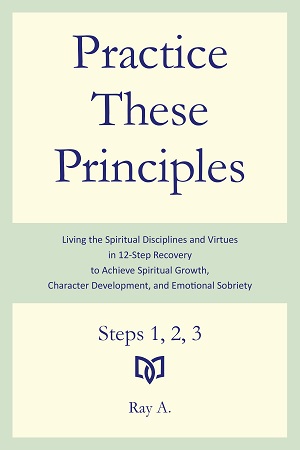
"We can now fully understand the nature of the admission that we make in Step 1: “Every newcomer is told, and soon realizes for himself, that his humble admission of powerlessness over alcohol is his first step toward liberation from its paralyzing grip [our emphasis].”10 Our admission may be forced by circumstance, and it may begin as a reluctant concession, but sooner or later the external process of being humbled or humiliated has to turn into an internal process of surrendering and humbling ourselves willingly and even gladly, for that is our path to freedom. . . .
Step 1 is the first step in the surrender of power. Indeed, our admission of powerlessness constitutes the foundational act of surrender. This admission is at first over our inability to stop drinking and restore order to our lives. But, as we work the Steps and grow spiritually, it progressively becomes an admission that, ultimately, we are powerlessness over life itself. Even the ability to surrender, we finally come to recognize, is a gift of grace. The desire to surrender is not natural to us, nor is the power to do so our own. What power we have is derivative. When we accept that all power resides in God, our surrender becomes total: if not always in practice, because we are still this side of heaven, at least in spirit.
This is the journey that we begin with Step 1. As we try to practice the principles of this Step in all our affairs, we will become more willing to admit that we are powerless not only over alcohol but over “people, places, and things.” We will accept defeat more quickly in our attempt to control what is beyond our power to control. We will be more ready to acknowledge our need for help, and less reticent to seek and accept such help, whether at meetings, from our sponsor, or in situations beyond the Fellowship of AA. We will become more open-minded as others share their experience with us, more willing to listen and learn, particularly as it relates to spiritual matters. We will become willing and eager participants in the process of deflating our own ego and taking an honest measure of who we really are.
Admitting powerlessness in later recovery may still come through pain and suffering, but it doesn’t have to. If we humble ourselves willingly, we may not have to be humbled forcibly through circumstance. We can admit powerlessness without having to go through defeat, despair and still another bottom. “We saw we needn’t always be bludgeoned and beaten into humility. It could come quite as much from our voluntary reaching for it as it could from unremitting suffering.”11
At first we “reach for a little humility, knowing that we shall perish of alcoholism if we do not. After a time, though we may still rebel somewhat, we commence to practice humility because this is the right thing to do. Then comes the day when, finally freed in large degree from rebellion, we practice humility because we deeply want it as a way of life.”12 No longer a response to the force of circumstance, or merely to duty and obligation, humility then becomes a stable disposition, a trait engraved in our character. What we call a virtue.
So can the other virtues embedded in the 1st Step become embedded in our character. As they take root in our heart and we begin to desire them deeply as a spiritual way of life, they will also give form to our emotions. We will be invited to practice them in distinct ways again and again, in Step after Step, situation after situation, through a variety of disciplines and in conjunction with other virtues that further their growth. As we do, one weakness after another will turn to strength."
For more PTP123 Excerpts, please click on link.